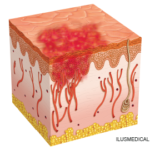Vasculitis is a general term for a group of rare diseases that involve inflammation of blood vessels. There are many types of vasculitis, and the different diseases that fall under this term may vary significantly when it comes to symptoms, severity, and duration. Most forms of vasculitis are rare and affect both men and women of all ages.
The causes of most types of vasculitis are not known. However, some cases of vasculitis are directly caused by reactions to medications. Additionally, some chronic infections—particularly those caused by hepatitis C virus or hepatitis B virus—can cause vasculitis. No other environmental exposures have been convincingly demonstrated to lead to vasculitis.
According to patient–fact sheet authors Paul A. Monach, MD, PhD, and Peter A. Merkel, MD, MPH, “Vasculitis can also be a part of several other rheumatic diseases—especially lupus, rheumatoid arthritis, and Sjögren’s syndrome. However, most patients with vasculitis have none of these underlying problems, and it is not hereditary.”
The wide range of symptoms seen in vasculitis reflects the potential for damage from poor blood flow to a variety of affected tissues throughout the body. For example, vasculitic damage to the lungs may cause shortness of breath and cough; damage to nerves may lead to numbness or weakness in a hand or foot; and damage to skin may produce red spots, nodules, or ulcers. On the other hand, vasculitis of the kidneys may produce no symptoms at onset but is quite a serious problem. Vasculitic diseases can be mild or life threatening and can range from a single episode to multiple episodes.
Physicians consider the possibility of vasculitis when a patient has symptoms, physical exam signs, or laboratory tests suggesting damage to one or more organ systems in the absence of another clear cause. Methods to diagnose vasculitis depend on the size of the vessel involved. Most patients can be diagnosed with a specific vasculitic disease based on the size of the affected blood vessels and the organs most commonly involved. However, for some patients, a specific type of vasculitis cannot be determined. A few forms of vasculitis can be diagnosed on the basis of a collection of clinical findings rather than biopsy or angiography.
Glucocorticoids, often referred to as steroids, are an important part of therapy for most forms of vasculitis, but dose and duration vary with the severity and chronicity of the disease. Other immunosuppressive agents are used either because the disease is so severe that glucocorticoids alone are insufficient treatment, or because the long-term side effects of these other drugs are less severe than those of glucocorticoids. Plasma exchange and intravenous immunoglobulin are sometimes used in severe cases of particular forms of vasculitis that are thought to be caused by circulating autoantibodies. Permanent damage from severe vasculitis can require surgical treatment, such as vascular bypass grafting, sinus surgery, or kidney transplantation.


